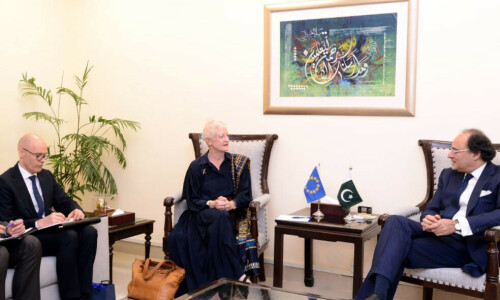KARACHI: Foreign Direct Investment (FDI) jumped 16 per cent year-on-year to $131.2 million in February, the State Bank reported on Wednesday.
The increase in February inflows was also a welcome change from January’s dire situation, which saw a net outflow of $173m.
However, the overall trend for the fiscal year remains troubling, with FDI falling by 17pc to $821m during the first eight months (July to February). More worryingly, inflows from China, traditionally Pakistan’s largest investor, saw a steep decline of 80pc during this period.
This fiscal year has witnessed massive fluctuations in FDI inflows, mainly due to political and economic uncertainties. December has so far seen the highest monthly inflows of $211m.
The SBP data indicates a persistently low interest from foreign investors over the past decade, prompting the formation of a new body aimed at attracting investment, particularly from the Middle East.
Eight-month inflows fall 17pc, investments from China plummet
However, the total inflows from Arab countries during July-February were $39.4m out of the global total of $820m FDI received by Pakistan.
Inflows of $23m came from the United Arab Emirates, $12.2m from Kuwait, $2.2m from Saudi Arabia, and $1.9m from Qatar.
The FDI inflows declined 25pc in fiscal 2023 compared to 2022. The current trend suggests that reaching even the $1.5bn mark received in 2023 might be ambitious under present conditions.
The dramatic drop of 83pc in Chinese investment, from $472.4m last year to just $80.4m, highlights the impact of political instability on investor confidence.
Concerns among Chinese power producers regarding outstanding payments of billions of rupees from the Pakistani government have further complicated the investment landscape.
The highest investment during July-February was noted from Hong Kong, with inflows surging to $234.6m from $150.5m a year ago.
Inflows from the United States and the UK were $79.6m and $163.7m, respectively, almost unchanged compared to the previous year. Inflows from the Netherlands stood at $58.7m.
On a sectoral basis, the highest investment was attracted by hydel power, which received $301.9m compared to $232.9m a year ago. Thermal power attracted $28.9m. The coal sector noted a net outflow of $82m, which was completely against the inflows of $316m last year.
Overall, the power sector received $249m in FDI, a sharp decline from $600m in the year-ago period.
The oil and gas power exploration attracted $151m compared to $78m last year, while the financial businesses (mainly banks) attracted $125m against $185m previously.
Published in Dawn, March 21st, 2024














































Dear visitor, the comments section is undergoing an overhaul and will return soon.